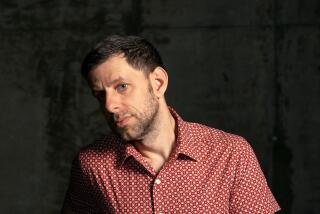Critic’s Notebook: A fresh start for the ‘Ring’ cycle
Saturday night, an E-flat began to rumble in the lowest instruments in the orchestra deep and unseen in the Dorothy Chandler Pavilion pit, and the world began anew as it does over and over again for devotees of the opera cult known as “The Ring.” The preparation has been intense. A decade in the planning, two years in the making, Los Angeles Opera’s first “Ring” cycle, four grand-scaled Wagner operas, has now begun and gone locally viral.
At the Music Center worldly Ring Heads and newbies, some dressed for a grand occasion, others comfortable for a long sit in jeans and sensible shoes, will now for the next month congregate, commune, eat sausages at Patina’s beer garden (where Wagner’s vegetarianism is not honored) and pursue ecstasy. A “Ring” festival, with elements serious and frivolous, is in full swing in the art world, academia and entertainment venues around town. Picketers, pumped up by the occasional art-adverse politician, protest an anti-Semitic composer. “Ring” literalists have begun puckering their lips to boo the fancifully philosophical and painterly director Achim Freyer when the creative team finally takes bows at the end of the first of the three cycles.
The audience arrived at the Music Center on Saturday night for “Das Rheingold” and Sunday night for “Die Walküre” (the first cycle concludes with “Siegfried” on Thursday and “Die Götterdämmerung” on Sunday) like an audience for Lady Gaga, pretty much knowing what to expect (if ready for a few variations in costume). Each of the four operas has been mounted individually over the last 16 months and Freyer’s striking visual imagery is by now a recognizable part of the L.A. landscape. We’ve come to know the cast and the complaints of singers who object to Freyer’s staging, costumes and steep rake. The masks and the merrily flamboyant symbolism have been discussed and should no longer startle.
And yet, Saturday, that low E-flat, which is felt as a vibration as much as it is heard as pitch, served to wipe parts of the memory clean. Maybe that is Wagner’s genius, the reinvention of ritual.
I was struck all over again by the strange beauty of this spectacle, the Cinerama-scaled panorama of the proscenium and the combination of high tech and primitive theater techniques, by the scenes of dramatic immediacy and those ineffably aloof, by silliness and profundity in such close quarters. Freyer has made many small refinements, mainly giving his ensemble of acrobatic actors —- who mingle with the singers and accomplish the more daring maneuvers — more to do. There is too much to take in, and too much time to take it in. The “Ring” requires a continual readjustment of our sense of time, space and of archetypes. Freyer follows Wagner in fabricating an unrecognizably mythic world in which we can see ourselves, but only if we strain.
For the most part, the performances Saturday and Sunday went smoothly. Many of the singers have become more able to cope with their surroundings and trappings. Wagner was the 19th century’s most unreasonable composer. His operas were meant to stretch the abilities of everyone who took part, and the works mean something to us today only if they can still stretch.
This has happened with several of the singers in the cast. In “Rheingold,” Freyer forces singers to convey emotion through masks. The dwarf Alberich, who steals the gold in the river Rhine to fashion a magic ring and rule the world, is costumed as a comic book fat-cat, yet Richard Paul Fink, though new to the production, conveys a marvelous maliciousness. Vitalij Kowaljow’s Wotan has grown in majesty, his Michelin-man mask is now a mechanism for new expressivity.
The biggest change was that Michelle DeYoung, who sang Wotan’s wife, Fricka (she with the long arms, painted clown face and illuminated hands in this production), Saturday was asked Sunday to step in as Sieglinde, the twin and lover of Siegmund, sung by Plácido Domingo. The outstanding Anja Kampe has pulled out of the production.
DeYoung was consequently pressed, rising from a mezzo-soprano role one day to a soprano one the next. Meanwhile, Ekaterina Semenchuk, a singer from Mariinsky Opera in St. Petersburg, Russia, took over as Fricka in Walküre with an arresting vibrancy.
Domingo required more effort vocally and physically than he had a year ago in this role. But he is a model Wagnerian, functioning with a determination and will that, after a shaky start, allowed him to rise to the occasion.
Linda Watson’s Brünnhilde does not take risks. She rose to the occasion less remarkably by metering her vocal fuel, beginning unimpressively but maintaining a reserve for a burst of steely soprano power at the end.
The Pavilion pit is an acoustic sound trap, and the company’s music director James Conlon has been coming up with various ways to cope. Rather than hope for orchestral atmosphere (one of the wonders of the “Ring”), he now compensates with lyricism and flow while maintaining his characteristically contagious enthusiasm.
His job, in a town with a short attention span, will be to keep it up.
More to Read
The biggest entertainment stories
Get our big stories about Hollywood, film, television, music, arts, culture and more right in your inbox as soon as they publish.
You may occasionally receive promotional content from the Los Angeles Times.











